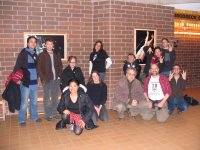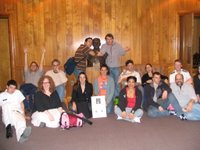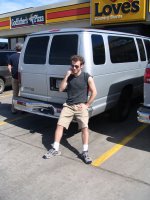 Waverly, IA
Waverly, IA - You may have wondered where I've disappeared to in the last few days. The answer lies in the fact that we've had an unusually long amount of time off, and during that time I found myself with limited access to the internet. It wouldn't have mattered much, however, as I just spent the time laying low anyway.
The chronological details are that we went from Pella IA to Platteville WI on Thursday, did
R3 on Thursday night at
UW-Platteville, and essentially had off from then until yesterday (Monday) when we travelled to Waverly IA to perform
Planet at
Wartsburg College this evening. The show at Platteville was a fairly typical performance of
R3, a little better than the past few performances. We did the show in the Brodbeck Music Hall, a very nice space as it stands for music and acoustics, but a little big for our show, I think. The gallant stools were packed with students, and I think they stayed with us through the performance.
But the essence of this post is not so much about the performances at Platteville; it's about me rummaging through the attics of my mind and dusting off a few items I was forced to put up there. Many of you might know I spent eight seasons (85-86, 90-94, 98) with the Wisconsin Shakespeare Festival, which took place on the campus of the University of Wisconsin-Platteville. It was a summer Shakespeare festival started by Tom Collins, Wendy Collins and Tom Goltry back in 1977. They were the theatre department at the college; Collins was the performance/historian guy while Goltry concentrated mostly on tech and design with some acting thrown in. Wendy was not technically on the faculty, but served as the festival's resident costume designer. It was a small festival, drawing its actors mainly from graduate training programs and the Milwaukee/Madison area, and lasted for 23 years until 1999, when a new university chancellor essentially pulled the plug on the festival and stole the foundation money which the festival had earned through the years. Collins and Goltry have both since retired; Collins to Arizona, and Goltry remains in Platteville. It had been eight years since the last summer I spent there as Associate Artistic Director and director of
The Miser.
I think it's fair to say that all throughout my middling acting career I have sought to work in the atmosphere of an ensemble troupe, a collection of actors who work often together and through the years develop that sense of playing together, knowing each other's tendencies, and building a body of work together. In short, I prefer situations where I, as an artist, have a "home." The WSF was, for the time it existed, that kind of home for me. I went back because people there appreciated my work and effort and offered me my first opportunity since getting out of graduate school to do significant acting work. As I developed my work in the city of Buffalo, I alternated with Shakespeare in Delaware Park, sometimes for family reasons, sometimes financial. But I loved going back to Platteville when I could.
I find it somewhat difficult to describe the attraction of Platteville and the WSF to outsiders. After all, it was a small festival set in the middle of nowhere, a very small midwestern town. I think it's because most theatre people tend to track their careers towards ever-growing and ever-more-recognized theatres and venues in larger and larger cities. I don't deny that in the back of my head I have those aspirations at times, but in reality I have been quite satisfied with finding smaller situations for myself. My teaching career is a reflection of that; I have not chosen to move up the ladder of university theatre departments, but have been quite content teaching in an undergraduate program at a small state college. I very much like working in Buffalo rather than pursuing a career in some other cities. And the same held true of Platteville. The WSF was more than a Shakespeare festival to me; it was a collection of good people, both from the festival and from the town, who became colleagues and friends, and in some instances like second family. I came to know a great many people in the area, I came to know the area itself quite well (particularly its golf courses), and it really was in so many ways a second home. I mean, a foursome for golf on a day off might include myself, the janitor of the Fine Arts Center, the superintendent of the local water and sewage plant (who doubled as an actor by night) and the lighting designer. That's the kind of place it was.
And we did some good theatre, and at times even great theatre. Our height was during that run in the 90s, when we assembled some fine talent from Milwaukee and the PTTP at Univ. Delaware. So many names - Michael Duncan, Lee Ernst, Laura Gordon, Laurie Birmingham, Mark Meinart, Elizabeth Heflin, Haasan El-Amin, Mic Woicek, Paul Steger, Mark Herold, Stevie Ray Dallimore, Chip Duford, Carine Montbertrand and so many more - all came through this way. During that time the festival was making a name for itself and gaining more credibility as a fine place to see Shakespeare. It's too bad that its demise came so quickly and brutally and it was not given a chance to re-locate or grow.
So, in visiting the area with the Blackfriars Stage Company after all these years, my mind and heart sort of got caught up in flood of memories of good times now gone. In a lot of ways the history of the festival has all but disappeared from UW-P's records and the town's memories. In its place is the Heartland Festival, an attempt to bring musical theatre into the area for the summer done by essentially amateurs. There is only one banner from the WSF hanging in the scene shop. I thought of stealing it, but then I thought that it was the only item from the WSF I could see that was still in the building apart from the Mary Barnes and Bert Glanz plaques, so I left it there. The UW-P has no section of its web site dedicated to the festival, and I have no idea if there are any archived records of its existence on campus. Dust in the wind.
So with my time there I looked up old friends and went about examining the city. When I arrived on Thursday I walked into the theatre after lunch, and who should be sitting there but old Doc Goltry. He had retired some 5 or 6 years earlier and had not set foot into the Center for the Arts since then, but it so fell out that the current musical theatre teacher and her husband had ferreted him out of his house to come down and design/consult on the set for their upcoming production of
Pirates of Penzance. He was the last person I expected to see sitting there, but we had a hearty greeting and chatted up old times for about two hours. We were joined by Jim Trenberth, longtime lighting designer for the festival, from Iowa State. Also on campus was Michael Duncan, who graduated from UW-Platteville and did 14 seasons with WSF. He was in town because he was doing some initial consulting for the Heartland Festival, for which he's directing a show in the summer. I had alerted most of these people I was coming in, so we had a dinner reunion at Uno's Pizzeria, and what a fun reunion it was. This Uno's is not the Chicago chain, but an independent restuarant which has been there since I've known the town. I knew the original owner as well as the present owner, and a number of wait staff over the years (in particular Diane, who used to greet me with a wet bartowel to the face the first time I walked in any summer). The place looked exactly the same, complete with a rendering of one Wendy's costume designs, and the trivia contest (which I answered correctly and got a free drink for Trenberth). Even the menu appeared the same, designed like a newspaper, complete with Tater Tuesday and Fettucini Friday. Soon enough the gang showed up: Doc and Carol Goltry, Maggie and Steve Kleisath with their daughter Katie and Maggie's mom Margaret (this is my "adopted family" in Platteville and my hosts for the time I stayed in town), Michael Duncan, Jim and I. Like old times. Doc's wife Carol is pretty close to being blind these days, but she hugged me fiercely, sat next to me and held my hand for a long time. I hated to go but I had a show to do, so I left to make a 6:00 call. After the show, I had arranged with Maggie for a small party at her house, so most of the company showed up at 11:00 PM to chat and party (thanks guys!). The company was dispersing the next day; some going to see loved ones, some friends, some family; the rest were having the time off in Madison.
The next morning I had breakfast with Jim and Michael at the Owl Cafe, one of my favorite haunts in P'ville. It's a small hometown cafe with about six tables and a counter crammed into a tiny space. The same people who operated it eight years ago were still there, Big Jim still making the best omlettes in the world. I had a Wundoe omlette, made with Wun-Doe-Mus, a local spice blend composed mostly of salt, Hungarian paprika, white and black pepper, onion and garlic powder. It's delicious and gar-ron-teed. It's a giant, fluffy omlette with Wun-doe-mus spice, sausage, salsa, sour cream and cheese with onions and peppers. Nothing else like it on the planet (I should have taken a picture). Great talk with Michael and Jim about old times. Then Jim and I went over to Doc Goltry's place for coffee and conversation, and Mike Willis, now retired from the sewage plant and helping his daughter open a sports store, came over for more chat about old friends and old times.
Now, Doc Goltry is a big, burly man, not easily given to semtiment. If you can imagine a Wilford Brimley, look-alike, that's Doc. He has a collection of sayings which he would frequently employ when directing or just hanging around the theatre. We were talking about the good old days, and we could tell Doc missed it a lot. He said one thing that stuck with me, which I believe he attributed to Mark Twain. He was talking about all the fun we had at the festival, how throughout the school year he'd always look forward to the summer and when the actors and technicians got it. He said, "You know, theatre is something like the ocean. It's so vast, that no one ever gets to see the whole thing at once and up close. But there's something to be said for standing on the beach and playing with the pretty pebbles. That's what we did, guys, play with the pretty pebbles, and damn, it was a good time!" The whole experience was happy and sad at the same time. Wistful, with a glint of tears in the eyes. As Friar Francis says in
Much Ado:
For it so falls out,
That what we have we prize not to the worth
Whiles we enjoy it; but being lack'd and lost,
Why then we rack the value, then we find
The virtue that possession would not show us
Whiles it was ours.
although I think we all knew what we had in some measure.
So Jim had to get back to Ames, and I went back to the Kleisaths, where Maggie was kind enough to give me the keys to Steve's Mazda Miata. The day was gorgeous and warm, so I dropped the top and took off over the county roads of the area, up and down the rolling hills of Southwest Wisconsin. Man, was that fun. Not only was the day beautiful, but the scenery was gorgeous, and Wisconsin's famous "dairy air" was in full aroma. I had seldom seen the area in anything but spring and summer bloom, so driving around in mid-March was a new experience. You can see so far and so wide that it's breathtaking. I could have driven for hours and hours, but I contained my enthusiasm and restricted myself to the Grant/Lafayette/Iowa county areas north and east of P'ville. My final stop was The Mound, home of the famous "World's Biggest M." The Mound now has a staircase going to the top (not in my day), so I climbed to the top for the view. I used to go there often with Jim or Paul or Mic on evenings with a 6-pack and perch there on an outcropping, talking, contemplating the stars and moon, the view, etc. It was a tradition to go up the mound on July 4, because from that vantage point you could see every fireworks display from every town within a 10-mile radius on a clear day. You can check out my picture page for some shots from the mound, one of which now graces my desktop.
For most of the rest of the time I simply stayed and ate and conversed with Maggie and Steve, who are two of the finest souls ever to grace the planet. They've become good family friends, of course, but I think at times I'm more like a wayward son to them. They adopted me and my family the first year Ann Marie and I were there. Ann Marie and Maggie both were La Leche League leaders, and both had Girl Scouts (the Kleisaths have three girls, all Girl Scouts along with Jenna). So they made some natural connections, and Ann Marie got in with a bunch of other mothers from the area. Maggie was a member and past president of the Ann Hathaway guild, a group composed of women who supported the festival and did things like "adopt an actor" and have them over for dinner. They also made tarts for sale at intermission for each show, and the actors used to get the leftovers during the second act. Their youngest daughter, Katie, was on her way to South Carolina for spring break, and their second daughter Beth and her new husband Joe came down from LaCrosse to visit me (Becky, their oldest, lives in St. Louis with her husband Craig and their new son William - guess who he was named after?) So I relaxed by staying with them for the most part. I watched the World Baseball Classic, and also took a side trip to Dyersville, IA and the Field of Dreams, the location for the movie of the same name with Kevin Kostner, Amy Madigan and James Earl Jones. Then, on Monday afternoon, the company came by to pick me up, and here I am in Waverly.
So that was my excursion into the mists of my past - a happy, joyful time mixed with a wistful longing for friends and experiences now fading fast in my rearview mirror. This acting business, for those of you reading this blog who might be thinking about this profession or finding yourself struggling in the midst of it, is in many ways an itinerant one. We wander from place to place, from city to city, from job to job. On this tour I have felt this wandering feeling moreso than at any point in my career, traveling from venue to venue. The adventuring is fun, but there is also that longing to return "home" to Staunton (which really isn't anyone's "home" at all, but the best we have at the moment). I've been a very, very lucky person in this business, because in my career I've been able to find two theatrical homes; one in Platteville for eight wonderful seasons, and one in Buffalo NY for almost 17 years. I like having a theatrical home, and I think in many ways it's something a lot of actors long for; a place to hang your hat, get steady work, and call it "home" at the end of the day. Spending four days in my former summer home has been a wonderful feeling, offering a sense of familiarity, place, and peace. While it may be true that you can never go home again, catching pieces of it glinting in the late winter sun across miles of vista is not a bad substitute. -TWL



















